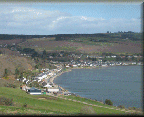Curriculum is the Latin word which was used by the Romans to describe the courses on which they held their chariot races. Later on, teachers used it to mean their courses of study. It was natural to use a Latin word for this, as in the grammar schools of the Middle Ages, Latin was an extremely important subject.
The Scottish Code of 1873 laid down specific standards in the curriculum for each stage of learning and these standards were to be achieved by each pupil at each stage. This was attained by a combination of rote learning, drill and corporal punishment.
At the start of the 20th century, there was a broadening of the curriculum from the 3Rs In 1900 navigation was taught in the Public School in Avoch, but according to the log book of 1903, there seems to have been some apathy by the local fishing population towards the subject. 1900 saw the introduction of cookery lessons and a teacher from Avoch attended Inverness on day release to gain a cookery certificate. On the occasion of the first lesson, the two local ministers were present. When room accommodation was extended in 1908/9, laundry lessons were added to the curriculum, and gardening was introduced for the boys, when a school garden was formed in 1911.
A new awareness of the importance of exercise developed. A style of exercise called drill was carried out by the class teacher, either in the classroom or outside, depending on the weather. This took the form of much movement of the arms and upper body, but little else, which is hardly surprising considering the number of pupils involved and the lack of space.

During this period it is surprising that PE was still conducted either in the playground or classroom in most schools. A few larger schools had gymnasia, and Dingwall was the only school to have playing fields.
In the early 20th century there were few secondary schools. The gap in the educational system was filled by supplementary or continuation classes which took place in the Primary School and when required took place in the evening. They were usually of a practical nature, providing dressmaking, cookery, laundry work, or needlework for the girls and woodwork for the boys. Locally it was compulsory to take English, and in 1923 is was possible for the boys to study navigation and book-keeping.
Unemployment was so bad in 1936 that the Ministry of Labour provided a 50% grant towards to the cost of running evening continuation classes.
Extra grants could be obtained if attention was given to singing and drawing. Drawing lessons were mainly of still life objects.
The three Rs
Reading began with the learning of the alphabet, and thereafter there was one reader for each stage, leaving the bright readers to continually re-read the same book. The lesson was conducted by pupils standing in a line, reading a passage in turn until everyone had read.

Writing was done on slates in the younger classes, as paper was so expensive. The upper classes had copy books and used nibbed pens and ink. The horrors of making blots, mistakes or using bad nibs must still be fresh in a few minds. The style of writing was cursive (“joining”) using “up light, down heavy”
The teaching of arithmetic consisted of rote learning the multiplication tables and the relationships between Imperial Units such as drams, ounces and pounds. There were endless money sums and problems using guineas, pounds, half-crowns, florins, sixpences, farthings etc. Do you remember the “bill” type of sum where you were 1/2d out in the total and spent hours trying to find out where you went wrong? Each day there was the “quick fire” mental arithmetic, and woe betide the poor pupil who hesitated too long before answering.
History was a subject taught by learning long lists of dates, facts and battles.
- What happened in 55 BC, 1066, 1314?
- Where is Hadrian’s Wall?
Geography teaching consisted of studying maps and marking on a blank map, perhaps
Both history and geography were very Scottish-oriented and equally unimaginatively taught.
Surprisingly few changes were made in the teaching of these subjects for nigh on 50 years, and one might argue as to whether all the recent changes have been for the better.
